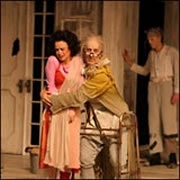 Terminal
Skinflint
Terminal
Skinflint
By Bill Marx
The Miser
By Moliere
American Repertory Theatre
64 Brattle St.
Cambridge, MA
Box office: (617) 547-8300
In Moliere's tragicomic ode to greed, Steven
Epp plays the miser as a whirling dervish of constipation, a portrait
of terminal skinflintery that, at times, becomes exhausting. The
paradox is representative of the American Repertory Theatre/Theatre
de la Jeune Lune co-production. At times, the evening is too much:
too wham-bam, too obvious, too slow. After all, the farce is the
portrait of a man who gives too little. But it is easy to forgive
(or at least tolerate) the excess because director Dominique Serrand,
adaptor David Ball, and the cast bring so much zesty comic invention
to the proceedings, including Theatre de la Jeune Lune's celebrated
flair for physical humor that extends from absurdist pratfalls
to linguistic acrobatics.
Epp's Harpagon manifests greed in all of
its forms, physical and spiritual, a crass entropy that distributes
money, kindness, food, and understanding out of an eyedropper.
But the performer withholds normal generosity with dazzling hysterical
energy, roaring out his disapproval of overfeeding his guests,
flicking out his tongue like an overheated lizard, searching every
inch of servants he thinks are stealing, holding onto his words
as if he didn't want to let them leave his mouth because they
are free. Wearing white shmattes, his thin body often as akimbo
as his hair, supplying funny voices and faces worthy of Jerry
Lewis on crack, as nimble as he is mean-spirited, Epp's aging
tightwad is a memorable grotesque, inhuman because he can give
away nothing but misanthropy.
Epp's egomaniacal monomaniac drives the
production, but he gets plenty of amusing support, especially
from Ball's rambunctious adaptation, which peppers the script
with references to the ancient Greek thinker Testicles and hilarious
oaths, from "Christ on a bicycle!" to speculation about what,
if anything, wafts out of the puckered ass of a dead chicken.
Occasionally, Ball's playfulness stoops for easy laughs. Why does
Harpagon's reluctant intended, the young Mariane, who is in love
with the miser's son, Cleante, talk as if she has barely mastered
grammar? Still, the script is filled with bursts of refreshing
verbal fisticuffs, the exaggerated language a contrast to the
parsimoniousness of the cheapskate.
Serrand's deliberate, sometimes frustratingly
slow-mo pace gives way on occasion to longueurs, especially when
the physical comedy flags. At the same time, the relaxed rhythms
of the staging presents the cast members, some from Theatre de
la Jeune Lune, others from the ART, with opportunities to embellish
their characters with tidbits of fresh comic detail. Karen MacDonald
shows off her impressive chops as a farceur in the role of the
scrappy matchmaker. As the wily and frenetic Frosine, MacDonald
is a worthy foil for Epp in their scenes together.
Other supporting performers are fine, though
less consistent. Remo Airaldi scores early on as the mumbling
servant who is both the miser's cook and stable master, but, because
he depends on a small number of behavioral tics, he eventually
wears out his welcome. Will LeBow is too old for the part of Valere,
who is in love with the miser's daughter, Elise, but he has moments
when his booming voice delivers the one-liner goods. Sarah Agnew,
as Elise, puts some unexpected backbone into the character's romantic
ditziness. Natalie Moore is adequate as the easily stimulated
Marianne.
Riccardo Hernandez's set -- an impressively
decayed and emptied-out mansion, a plastic sheet stretched over
a massive hole in the ceiling -- doesn't overwhelm the performers.
It serves as an aptly decadent frame for the action. Some of Serrand's
surreal ideas are delectable, such as a slot in the bathroom wall
for toilet paper (shred newspaper) to be pushed through, and a
novel way for Harpagon to collect his bath water. Freud equated
money and offal; the production explores this satiric take on
materialism with gusto.
This Miser is generally funny
and/or fascinating enough, though it runs out of the steam by
the end. Even Harpagon begins to nod off during the final scenes.
And the appearance of a coffin is a mistake. Perhaps Serrand was
driven to underline, yet again, his vision of the play's tragic
undercurrents. Harpagon is not simply socially isolated; he shrivels
into nothingness. Or is it the director's utopian wish fulfillment?
Whatever the reason, Serrand suggests that the tightfisted monster
is heading for the last roundup. Moliere's conclusion is far more
frightening: greed is immortal.
[This review was first published on WBUR.org]
